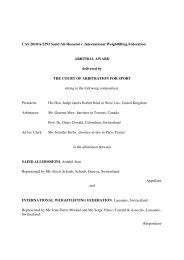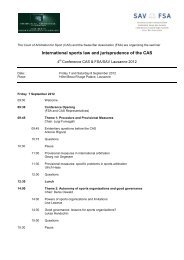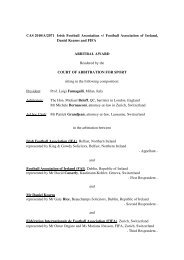(CAS) Bulletin - Tribunal Arbitral du Sport / TAS
(CAS) Bulletin - Tribunal Arbitral du Sport / TAS
(CAS) Bulletin - Tribunal Arbitral du Sport / TAS
Create successful ePaper yourself
Turn your PDF publications into a flip-book with our unique Google optimized e-Paper software.
effectiveness and validity of that arbitral award under<br />
Israeli law, stating that the IFA arbitrator did have<br />
jurisdiction and rejecting the Appellant’s request to<br />
set aside the award.<br />
Accordingly, the IFA Arbitrator ’s award of 22 October<br />
2007 is fi nal and binding under Israeli law; in other<br />
terms it is res judicata in the Israeli legal system. As a<br />
consequence, the crucial issue to be solved by this<br />
Panel is whether, as an arbitration panel sitting in<br />
Switzerland, it must also consider that foreign award<br />
as res judicata. If the answer is in the affi rmative, the<br />
Panel would be precluded from adjudicating again<br />
the same matter, given that the principle of res judicata<br />
is a fundamental principle of Swiss proce<strong>du</strong>ral public<br />
policy whose violation would yield the nullity of the<br />
award (see the decision of the Swiss Federal <strong>Tribunal</strong><br />
of 13 April 2010, 4A_490/2009, which set aside a<br />
<strong>CAS</strong> award for violation of the res judicata principle).<br />
In order to consider the IFA Arbitrator’s award as res<br />
judicata, the Panel must fi rst check whether such award<br />
is recognizable in Switzerland. Indeed, as the Swiss<br />
Federal <strong>Tribunal</strong> has stated, “le principe de la chose jugée<br />
[ne s’applique] qu’à l’égard d’un jugement étranger susceptible<br />
d’être reconnu en Suisse” (ATF 127 III 279, at 285; freely<br />
translated: “the principle of res judicata [is] only applicable<br />
if the foreign judgment could be recognized in Switzerland”).<br />
Pursuant to Article 194 PILA, the recognition and<br />
enforcement of foreign arbitral awards are governed<br />
by the New York Convention. Given this direct<br />
reference by Swiss law to the New York Convention,<br />
the latter’s provisions apply vis-à-vis any other<br />
country. In any event, Israel has been a party to the<br />
New York Convention since 7 June 1959.<br />
In order to recognize a foreign award under the New<br />
York Convention, the fi rst element to check is whether<br />
the decision under scrutiny is a true “arbitral award”.<br />
On the basis of the evidence before it, the Panel fi nds<br />
that the proceedings before the IFA Arbitrator must<br />
be considered as true arbitral proceedings.<br />
The Panel notes that throughout the whole litigation<br />
in Israel – <strong>du</strong>ring the arbitration proceedings fi rst<br />
and <strong>du</strong>ring the judicial proceedings later – the<br />
Appellant never raised any objection as to the arbitral<br />
character of the proceedings administered by the IFA<br />
Arbitration Institute (he did raise objections as to the<br />
jurisdiction of the IFA Arbitration Institute, but this<br />
is another issue altogether). Even more signifi cantly,<br />
the Appellant did not raise any such objection <strong>du</strong>ring<br />
these <strong>CAS</strong> proceedings and always made reference<br />
in all his written submissions to the IFA Arbitrator’s<br />
award as a true arbitral award issued by a true arbitral<br />
tribunal.<br />
Only <strong>du</strong>ring the <strong>CAS</strong> hearing, for the fi rst time, the<br />
Appellant raised some doubts on the IFA Arbitration<br />
Institute and asserted that there is no certainty that<br />
the IFA Arbitrator’s decision is a true arbitral award.<br />
The Panel holds that, pursuant to Article R56 of the<br />
<strong>CAS</strong> Code, this argument was belatedly raised and<br />
is thus inadmissible. In any event, the Panel is of<br />
the view that, even if the argument had been timely<br />
submitted, it would not be supported by the evidence<br />
on fi le.<br />
Indeed, as the Appellant acknowledges in its<br />
submission of 12 June 2011, the IFA Statutes provide<br />
that the Arbitration Institute is independent in its<br />
decisions, provide for a mechanism to appoint the<br />
arbitrators for the indivi<strong>du</strong>al cases (the appointing<br />
authority being the IFA presidency), provide that the<br />
appointed arbitrators are subject to the arbitration<br />
laws of Israel and provide the Arbitration Institute<br />
regulations to establish a proce<strong>du</strong>re to solve disputes<br />
between players and players’ agents. Furthermore, and<br />
decisively, two Israeli state courts have thoroughly<br />
scrutinized the IFA Arbitrator’s award and have<br />
unequivocally treated such decision as a true arbitral<br />
award and the IFA Arbitration Institute’s proceedings<br />
as genuine arbitral proceedings governed by Israeli<br />
arbitration laws. In particular, the Israeli Supreme<br />
Court has “not found that there were signifi cant proce<strong>du</strong>ral<br />
defects in the arbitration proceedings” (see last page of the<br />
translated Israeli Supreme Court’s judgment of 4<br />
November 2009).<br />
The Appellant ha s not submitted to the Panel any<br />
proof – for instance, an expert opinion on Israeli<br />
law – which could contradict the above signifi cant<br />
evidence. The Panel thus concludes that the IFA<br />
Arbitration Institute administers true arbitral<br />
proceedings and the IFA Arbitrator’s decision dated<br />
22 October 2007 is a fully fl edged arbitral award,<br />
capable of being recognized and enforced outside of<br />
Israel pursuant to the New York Convention.<br />
Parenthetically, the Panel notes that, contrary to what<br />
both parties seemed to imply in their submissions, the<br />
same may not be said for the FIFA-PSC proceedings<br />
and decisions. In fact, as the <strong>CAS</strong> noted on several<br />
occasions, the proceedings administered by the FIFA<br />
adjudicating bodies are not true arbitral proceedings<br />
but rather “intra-association” proceedings (<strong>CAS</strong> 2009/<br />
A/1880-1881, para. 50), and the decisions issued by<br />
those bodies are not arbitral awards but decisions of<br />
a Swiss private association (<strong>CAS</strong> 2003/O/460, para.<br />
5.3). This has been confi rmed by the Swiss Federal<br />
<strong>Tribunal</strong>, which has often made reference to any<br />
FIFA-PSC decision as “a decision of a Swiss association”<br />
(Judgment of 13 April 2010, 4A_490/2009).<br />
Jurisprudence majeure / Leading cases<br />
-<br />
70





